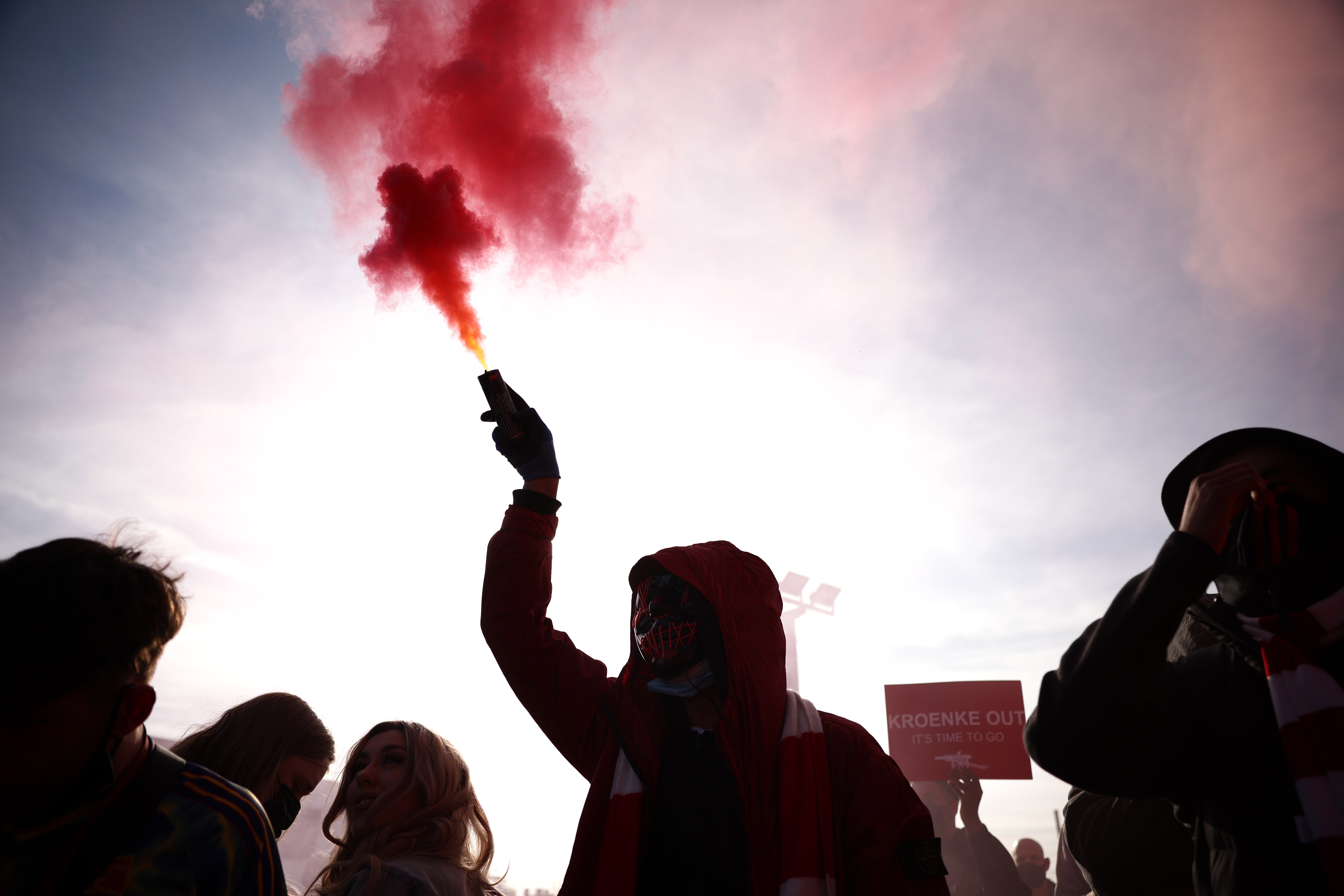Distraction, Brexit, soft power: How the UK government used football for its populist principles
During the global pandemic the game has been used in various guises by the Conservatives, writes Melissa Reddy. Will they now give back to football?


Hello there, Government Fan-Led Review into Football, the great saviour of the English pyramid that has, checks notes, one supporter representative on its 10-person panel with no transparency over the selection process.
And so the long sigh, the shake of the head, the unmistakable feeling of optimism being crushed by the reality that we’re likely being guided down the path of nothing meaningful again.
The review, part of government’s manifesto that lay dormant for years and was only pushed following the failed Super League, has hopefully not started as it means to go on.
Danny Finkelstein, the ‘independent member’ on the panel, is a peer to the Tories. James Tedford is referenced as the former Secretary at Southport FC to boost non-league visibility, however there is no mention that his current employers are Chelsea.
There are quite a few things that jar about the make-up of the team, which is not only light on fan representatives, but on experts in regulation and governance.
It is natural to feel underwhelmed by it, especially since previous such reviews – such as the 2016 Expert Working Group on Football Supporter Ownership and Engagement – proved meaningless. Will this time be different?
“I think we have a stronger window of opportunity now,” Dr Borja Garcia, a leading academic on global sport policy and governance from Loughborough University tells The Independent. “Previous reviews of this kind haven’t worked. The Taylor Report, which was far more independent because a former minister wasn’t involved, actually brought about change. The problems were clearer then and there was no other option but change.
“That was when the window of opportunity was strongest. So I think we’re in the middle of the meaningless parliamentary reviews and the Taylor Report. It’s clear there is social unrest and unease at the excessive commercialisation of football without consequence and this is an agenda that will thus appeal to Boris Johnson’s populist government because it will buy votes.
“If they bring meaningful governance changes to the sport, it will be seen by the public as a win, as levelling things up. But then you must not forget they allowed the broadcasting contracts to roll for another three years without competition for a mere £100m, which is the opposite of levelling up.
“The biggest conclusion people want is a change to governance structures, but I don’t think we’ll see a shift and the power will remain with the Premier League clubs. Hopefully we will have greater accountability, transparency and fan input at the very least. This government has used football a lot so here is their chance to give back.”
The national game has served as a vehicle for distraction, soft power and a means to paint the ‘success’ of Brexit during the global pandemic. Last April, as the government were failing in getting coronavirus test kits in place for NHS workers, the salaries of footballers became the major talking point as a diversionary tactic.
Julian Knight, the Conservative MP, flagged the “moral vacuum” players operate in. This is a man who has consistently been in opposition to paying higher benefits to those unable to work due to disability or illness and was in favour for reduction in spending on welfare benefits.
“The intensity in which football was used and the intensity of the attacks against the players was a bit surprising, but this is the gut reaction of a populist government,” Garcia says.
“I don’t think it was strategic, more opportunistic but it was a good way to bury things like NHS workers going unpaid or their derisory salary increase. Football gets people’s attention and so it gets press coverage and you then reinforce the news cycle when you attack it.”
This was the case in January, when after the horrendous handling of Christmas led to another lengthy lockdown and hospitals in Britain were running out of oxygen, goal celebrations were being discussed by ministers as “an insult to the NHS.”
Using footballers as scapegoats during the pandemic or using the Super League debacle to promote populist policies does not help deal with any of the long-standing governance or finance issues in the game
Amid using football to run interference, the government has used it to foster its wider strategic interests. The Prime Minister was personally lobbied in the Saudi Arabian Public Investment Fund’s bid to buy Newcastle United, with one of the co-investors, Jamie Rueben, a major Conservative party donor.
The Saudi crown prince Mohammed bin Salman was understood to have privately contacted Johnson last June, complaining about the stalling of the takeover that ultimately fell through, with a warning it would have “a negative impact on both our countries [sic] economic and commercial relations”.
Garcia viewed this as a “more common” use of sport by governments, facilitating soft power and whitewashing of reputations.
“The UK will jump into any opportunity at new global investment now to market it as a success for Brexit,” he says. “And on that note, the line that government could intervene and help stop the Super League because of Brexit is completely untrue.”
The threat of dropping “legislative bombs” to hurt the ‘Big Six’ clubs that joined the breakaway tournament was one of the major hinderances to the aborted Super League. But the ability to do this would not have been any different prior to Brexit.
“The European Union does not have exclusive competencies on sport,” Garcia explains. “It has a supporting competence under Article 165, which allows member states to deal with its own legislation. It was not Brexit that allowed this, it was possible before.
“So with Greece in 2006, for example, who were able to change their entire sports law, the problem was not being a member of the EU. The problem was that Fifa didn’t want government interference.”
Where Brexit has actually played a part is in the Premier League’s three-year renewal of its TV rights deal with UK broadcast partners. The UK Competitions Act allowed the government to make a quick decision on this.
“Previously, the Premier League would have had to negotiate with the European Commission,” Garcia says. “I think they would have still got the green right for the renewal that way because let’s not forget it was the European Commission that allowed the Premier League’s first-ever exclusive deal with Sky, which was over a longer period of five years.
“It was definitely easier to negotiate with the UK government, however. And without Brexit, they wouldn’t have had the power to make this decision.”
Alison McGovern, the Shadow Minister for Culture and Sport, has urged the Conservatives to do right by football after manipulating it so shamelessly.
“Using footballers as scapegoats during the pandemic, or using the Super League debacle to promote populist policies does not help deal with any of the long-standing governance or finance issues in the game,” she tells The Independent.
“I can understand the cynicism of supporters faced with this display. The test now is whether the ‘fan-led’ review will really be able to face down powerful interests and achieve actual change. Or if we can expect more distraction and obfuscation from the government given their record.
“I would like to see legislation brought forward to facilitate fan ownership of clubs, as well as independent powers for a body to regulate football in the interests of fans. This is not beyond us, and there is much cross-party support in Parliament, as well as a well signed public petition calling for Parliament to act.
“Ultimately, we need reform to football finances to make the pyramid genuinely competitive and sustainable.”
Join our commenting forum
Join thought-provoking conversations, follow other Independent readers and see their replies
9Comments